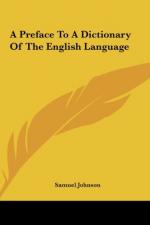I have not rejected any by design, merely because they were unnecessary or exuberant; but have received those which by different writers have been differently formed, as viscid, and viscidity, viscous, and viscosity.
Compounded or double words I have seldom noted, except when they obtain a signification different from that which the components have in their simple state. Thus highwayman, woodman, and horsecourser, require an explanation; but of thieflike or coachdriver no notice was needed, because the primitives contain the meaning of the compounds.
Words arbitrarily formed by a constant and settled analogy, like diminutive adjectives in ish, as greenish, bluish, adverbs in ly, as dully, openly, substantives in ness, as vileness, faultiness, were less diligently sought, and sometimes have been omitted, when I had no authority that invited me to insert them; not that they are not genuine and regular offsprings of English roots, but because their relation to the primitive being always the same, their signification cannot be mistaken.
The verbal nouns in ing, such as the keeping of the castle, the leading of the army, are always neglected, or placed only to illustrate the sense of the verb, except when they signify things as well as actions, and have therefore a plural number, as dwelling, living; or have an absolute and abstract signification, as colouring, painting, learning.
The participles are likewise omitted, unless, by signifying rather habit or quality than action, they take the nature of adjectives; as a thinking man, a man of prudence; a pacing horse, a horse that can pace: these I have ventured to call participial adjectives. But neither are these always inserted, because they are commonly to be understood, without any danger of mistake, by consulting the verb.
Obsolete words are admitted, when they are found in authours not obsolete, or when they have any force or beauty that may deserve revival.
As composition is one of the chief characteristicks of a language, I have endeavoured to make some reparation for the universal negligence of my predecessors, by inserting great numbers of compounded words, as may be found under after, fore, new, night, fair, and many more. These, numerous as they are, might be multiplied, but that use and curiosity are here satisfied, and the frame of our language and modes of our combination amply discovered.
Of some forms of composition, such as that by which re is prefixed to note repetition, and un to signify contrariety or privation, all the examples cannot be accumulated, because the use of these particles, if not wholly arbitrary, is so little limited, that they are hourly affixed to new words as occasion requires, or is imagined to require them.




